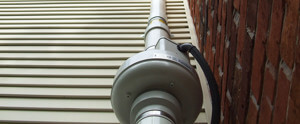Radon Specialists Descend on St. Louis
The American Association of Radon Scientists and Technologists will hold its 21st International Radon Symposium Sept. 20-23 in St. Louis at the Union Station Marriott. Organizers say the event will provide an opportunity for the scientific and medical communities to exchange ideas and information about radon, which they note is a serious, global health threat and remains the second-leading cause of lung cancer in the United States.
In addition to a number of concurrent and plenary sessions, the event will include an all-day pre-symposium Missouri Granite Geology Field Trip on Sunday, Sept. 20, from 7 a.m. to 7 p.m., led by David Malone, Ph.D., chairman of the Department of Geology and Geography at Illinois State University, and Robert Nelson, Ph.D., associate professor of geology.
Dr. William Field of the University of Iowa and the World Health Organization International Radon Project will deliver the first of Monday's keynote presentations, "Why the Radon Message is More Important than Ever," addressing radon science and NCRP 160, from 8:15 a.m. to 9 a.m. Terry J. Leach, R.N., J.D., M.A., will deliver the second, "Keynote on Principles of Health Policy: Radon," from 9 a.m. to 9:45 a.m.
Wednesday from 3 p.m. to 4 p.m. AARST Symposium Program Chair Trudy Smith of Spruce Environmental will moderate a panel presentation and discussion on "The State of the Granite Debate," focusing on the issue of radon and radioactivity from granite countertop materials, the amount of emanation involved, the proper devices to test for it, and the proper evaluation of the health risk to occupants of a home with this material in it. AARST says the "discussion will not advocate granite testing by the Radon industry but it will update members on the current findings of researchers and industry organizations looking into the issues. Using the public interest in the controversy to advocate whole house radon testing will also be covered as serious levels of soil based radon have been found while testing granite in homes."
Other industry experts on hand at the event include Dr. Ferid Shannon of the WHO; Tom Kelly, director of the U.S. EPA's Indoor Environments Division; William Angell, AARST president and director of the Indoor Air Quality Project at Midwest Universities Radon Consortium. For more information and registration, visit www.aarst.org.




